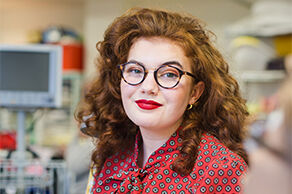Applying to university can be a nerve-wracking time for anyone, but for students living with a disability it can be especially stressful, as there are many extra considerations to take into account on top of all the standard applicant processes and paperwork. As a student who successfully applied to and studies at university with a disability, I’ve got some top tips and advice to help you navigate your own application journey.
Researching universities
Knowledge is power, so when it comes to researching universities, some key things that I took into consideration were; the universities’ history of student satisfaction, the information they had available about support for students with disabilities, any information from students sharing their personal experiences and what experiences they had with accessing the support they needed. BCU has a Pre-Entry Disability Adviser, Darren Martin, who would be delighted to talk to you about support at university. I'd advise you to seek out support staff at any universities you are applying to who will be able to offer your more tailored advice.
Many students will think about the geographical location of their uni in regards to the distance from home or the quality of the social scene and nightlife. As a disabled student there’s a whole other list of geographical requirements to prioritise when doing your research including; access to healthcare facilities, access to supermarkets, and general transport links. It’s important to try and be in close proximity to services essential to you and your quality of life to help you save as much energy (and time) as possible.
Disclosing your disability
Whilst it is scary and sometimes overwhelming to have to disclose your disability, especially if you don’t have a formal diagnosis, it is best to disclose it as soon as you can – be that on your UCAS application, directly to the university (if you are applying through Clearing or direct entry) or as soon as you notice your quality of life being impacted by something you are living with that you are considering/seeking medical intervention for.
The sooner your disability is documented the quicker support systems can be set in motion and tailored to your needs. Disclosing your disability at the earliest opportunity also means you can get assistance to apply for Disabled Students' Allowance (DSA) sooner. Every student who is flagged on the UCAS system as having disclosed a disability is contacted by the University to ask if they’ve applied for DSA, and if they’ve had a meeting to discuss their disability and its impact on them to create a student support statement - this is used at the student's discretion to inform module leads and academic staff about any requirements and support a student may need to reach their full potential.
Disability support checklist
Make sure you're ready for university with our disability support checklist
Resource availability
Universities are better funded than colleges, sixth forms and high schools, meaning they are better able to support students who need it, including students with disabilities. Support can come in a variety of ways from having a note-taker or equipment provided to record lectures, additional support for library use and study skills, laptops with additional software to make studying more accessible, extra time in exams, priority access to study spaces and seats in lecture theatres, assistance with travelling to university and placements with subsidised taxis. The list goes on, so rest assured that there are plenty of processes in place to help support you on an individual basis. I would recommend contacting the support team at any university you are applying to so you can really acquaint yourself with the resources you will or won't have access to if you choose to study there. Find out more about the support BCU offers.
Interview experience
Not all courses require you to have an interview, but as a nursing student I did have to attend one. My interview experience was instrumental in helping me to make my decision about which university to apply to. When I applied to university for a second time my disability was more prominent and I was completely at a loss as to how that would impact my degree and career goals. I felt panicked and asked lots of questions about what support there was for disabled students at the University to help me make an informed decision. I made sure to ask about accessible accommodation, support for placements and future employment if I ever needed that and came out of my interview feeling much more reassured.
I was also impressed to find out that here the Head of Disability Services, Kate Waugh, has a disability. This was really reassuring to me as it meant she had personal experience and understanding towards students with disabilities compared to someone who wasn’t living with a disability. That being said staff who work within student support will be trained to work with a broad variety of additional needs to enable them to best support the students seeking help.
Applicant Taster Days/ Open Days
Applicant Taster Days and Open Days are the BEST way to find out if a university works for you, these are days when you get to experience what university can be like as a whole, you meet lecturers, students and student support staff who are there to support you in every aspect of student life.
Many universities will also be able to make specific adjustments to cater to your needs and ensure the Open Day is accessible for you, so I’d encourage you to reach out to the support teams before attending an Open Day to discuss this and ensure that you can have the best experience possible.

